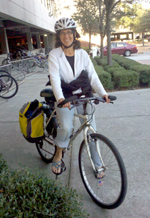|
Amy
Horwitz, Ph.D., assistant
professor in the Department of
Otolaryngology, rides her bike
to work and shares her thoughts
about the bike accessibility
issue at MUSC:
How far
is the commute?
Three-plus miles each way, from
Magnolia Road in West Ashley to
Walton Research Building (Sabin
Street). I ride Highway 17 to 61
over the Ashley River on the
southbound bridge because it has
wider sidewalks. Then Lockwood
Boulevard to Calhoun Street to
Jonathan Lucas to Sabin.
 Dr. Amy Horwitz
bikes to work Monday through
Friday. Dr. Amy Horwitz
bikes to work Monday through
Friday.
Why do
you bike to work?
The fantastic views and smells
that I'd miss in a car, especially
along the marsh and river, the
changing colors of marsh grass
with the seasons; scurrying crabs;
heron, egret, ibis intent on
fishing; pelicans flying in
formation; occasional otter or
dolphin playing in the river...
The fresh air and exercise,
sometimes the only opportunity of
my mostly sedentary work days. The
minimal expense — maintaining a
bike is so cheap compared to even
just the gas and parking costs of
driving, not to mention other
car-related expenses. Time and
convenience: both biking and
driving take about 30 minutes,
door-to-door. The time on the bike
is a pleasure; the time in the car
is stressful — traffic, parking,
carrying my stuff from the parking
lot to my office vs. parking my
bike right outside my building and
carrying my stuff a short
distance. When looking for a home
to buy, a good bike commute to
MUSC was a major consideration.
The friendliness of other bikers
and walkers who I encounter during
my commutes contrasted with the
impersonal or stressed drivers I
see when I'm in the car.
Do you
have any concerns about biking
to work?
Both the design of many Charleston
roads as well as the awareness of
many drivers are not conducive to
bicycles safely sharing roads with
cars. Minor concern — limited
availability of bike parking
spaces that are safe, convenient,
and sheltered from the rain. My
bike chain gets rusty.
What is
available to address those
concerns?
A number of bike advocacy groups
are working on the first concern.
Perhaps as driving cars becomes
more expensive, more people will
find alternatives such as
car-pooling, public transport,
biking, etc. Regarding minor
concern of parking: Including more
sheltered bike parking where
feasible around campus would be
great.
In May, a
survey was conducted to
investigate commuting issues at
MUSC. The majority of respondents,
82.2 percent, travel five or more
miles to work, with 75.2 percent
driving and 9 percent taking a
bus. Most respondents would not
consider riding a bike to work
because of lack of changing
facilities, inadequate parking,
lack of bike lanes, crossing the
Ashley River, the distance being
too great and the need for more
flexibility. Providng additional
comments, the majority of the 380
respondents offered suggestions
related to CARTA, parking
challenges and biking issues.
Respondents included safety as a
barrier to biking to work.
The MUSC
Mobility Task Force is working to
create a community that has bike
accessibility, both at MUSC and in
the surrounding areas to increase
commuting options and promote
active lifestyles to employees and
the community. To become involved,
contact Susan Johnson at
johnsusa@musc.edu.
|



 Dr. Amy Horwitz
bikes to work Monday through
Friday.
Dr. Amy Horwitz
bikes to work Monday through
Friday.